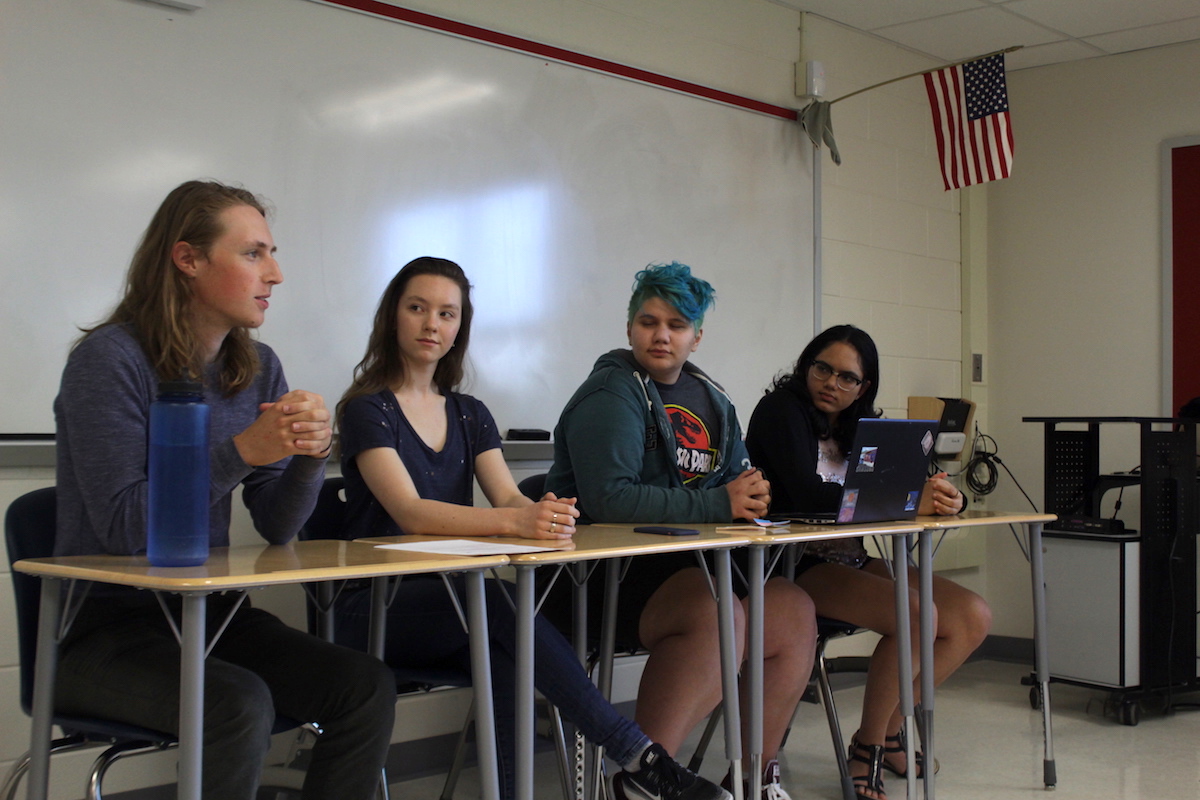GSA educates on interacting with and supporting transgender people
From left to right, senior Sam Libberton, senior Sofiya, junior Ash Rozzi and senior Shraddha Pradeep hold the panel during A-block.
May 14, 2017
Jefferson’s Gender-Sexuality Alliance (GSA) hosted eighth period blocks to provide education on supporting transgender people on May 8. Panelists junior Ash Rozzi, president and senior Sofiya Boroday, senior Sam Libberton and senior Shraddha Pradeep presented during A-block, and Rozzi, Boroday, Pradeep and senior Sarah Crossen presented during B-block. After discussing topics including how to support and interact with transgender individuals, in addition to promoting organizations and programs that assist transgender people, the event was opened up for the audience to ask questions.
“It was very important to us that we provided explanations for every point discussed in our presentation and panel,” Rozzi said. “We took it a step farther with information on small ways to support the transgender community that anyone, even busy TJ students, can do that would make a significant impact, for anyone who wanted that information.”
A lack of current education and a political climate with “efforts to legislate [transgender people] out of participating in public life,” Rozzi said, spurred the club to host the event. Planning began during spring break, led by transgender students Rozzi and junior alumnus Fae Young, along with other transgender students and the panelists.
“We wanted to help end transphobia in the TJ community but unfortunately not many people at school are trans and not many have a lot of trans friends,” Young said. “Understanding the diversity of gender alignments and how trans people are affected by transphobia allows cis people to challenge their own biases and transphobia, challenge cisnormativity especially in popular culture, share the benefits of cis privilege with trans people, such as donating to trans people’s’ transition funds, learn and grow, and call out transphobic jokes and stereotypes.”
Panelists also promoted the GSA’s drive for Casa Ruby, an organization that provides aid to transgender people and suggested app Refuge Restrooms, in which users can map gender neutral and accessible public restrooms, and the #IllGoWithYou campaign, where people can designate themselves as people that will defend transgender individuals or accompany them to gendered spaces.
“Giving people a guarantee that they’ll have a place to use the restroom that is accessible [and] safe for them is so vastly important, given how basic a function of needing to use the bathroom is to everyone,” Rozzi said. “Having that guarantee gives people more mobility, peace of mind, and autonomy when they go out in public or travel. It gives people an increased ability to participate in public life and activities that they enjoy; basically, it removes a restriction that so many transgender and/or disabled people have in their lives.”
For those who feel that they may be transgender, and are looking for support, Rozzi recommends resources listed on the Transgender Education Association of Greater Washington. Young also recommends online and in-person resources and groups to reach out to.
“Some good places to start would be your school counselor or a therapist if you have one, but there are also supportive communities on social media and forum platforms such as Facebook, Tumblr, and AVEN [Asexual Visibility and Education Network], and your school’s GSA,” Young said. “You can typically find a lot of information about trans and gender things on GLAAD [Gay and Lesbian Alliance Against Defamation], PFLAG [Parents, Families and Friends of Lesbians and Gays], and Gender Wiki.”






